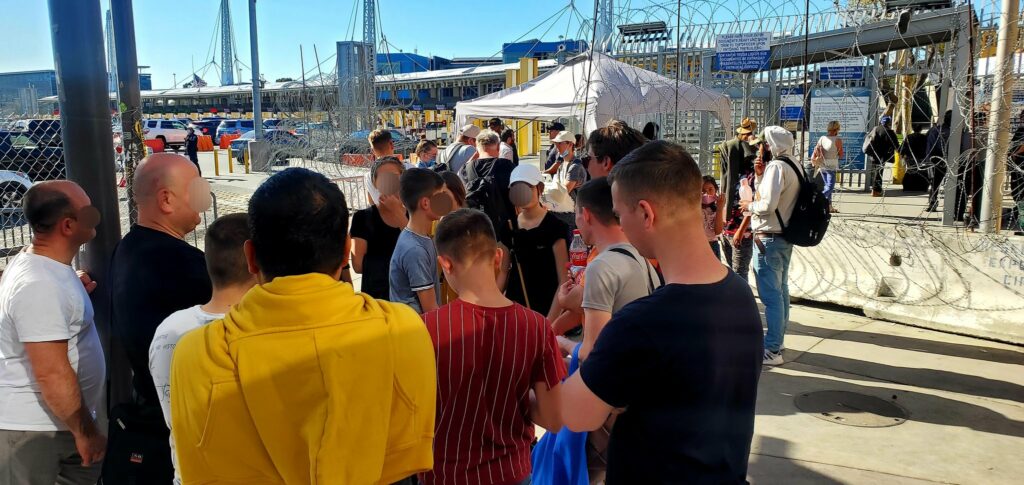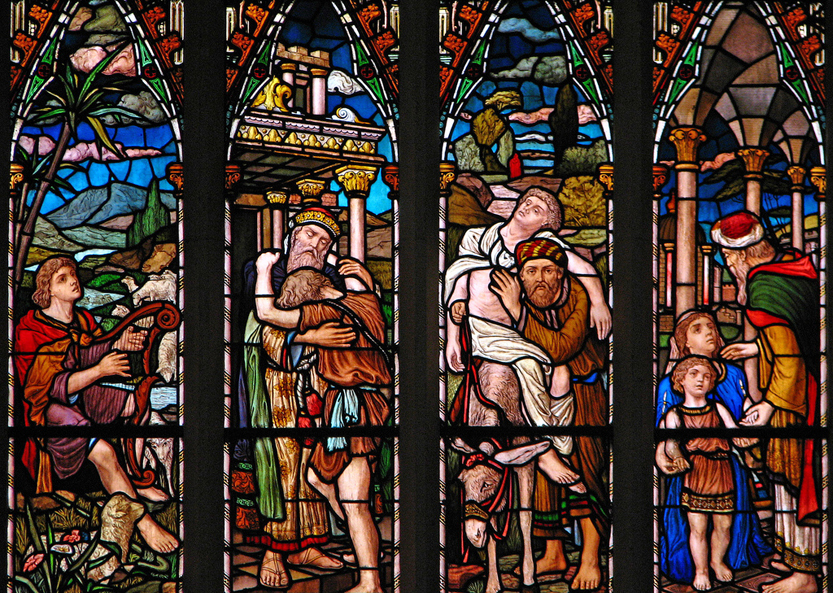A sermon on Luke 15:11-32, accompanied by a reading of “2 Sons” from Amy-Jill Levine and Sandy Eisenberg Sasso’s Who Counts?, for University City United Church in San Diego, CA.
The story that Tim just read is a children’s adaptation of the scripture for today, a parable you may have heard described as the story of the “prodigal son.” The most popular contemporary interpretations would tell you that this is a story about redemption.
A young son of a rich man disrespects his father, asking for his half of the estate before his father passes away, then goes off and squanders his inheritance in a time of famine, only to come back running home to dad when things get tough. His dad greets him with an extravagant welcome, and the whole family rejoices. Well, the whole family except that greedy older brother who’s just jealous he’s not getting the same celebration. And so, the common telling goes, God is like the father who welcomes us home when we realize the error of our ways and come back to our senses.
But that narrative just doesn’t quite make sense to me.
##
For one thing, I can’t help but wonder if a story like that would not have been all that new or interesting or worth recording to the gospel-writers.
If you look at the Hebrew scriptures, if you follow the religious tradition Jesus and his audience were a part of, all you see is a constant story of wandering and redemption.
The first hearers of this story would’ve done a “yeah, cool” to the redemption stuff.
The story of the prodigal son’s redemption is not what is innovative here.
##
Another thing: this is not a story that was meant to be read on its own.
This story is the third in a triad that includes two other parables you may be familiar with: the parable of the lost sheep, and the parable of the lost coin.
A triad like that would fit right into a narrative pattern Jesus’ first-century audience would have known well: two stories that follow the same outline, and then a third story that almost follows the outline… with maybe one or two important deviations. When there’s a triad like that, it’s our job to look for the bumps. There parable-teller is saying “one of these things is not like the other…” and inviting us to look for the difference.
To help us with that, here’s a quick refresher on the other stories.
In the first story, the parable of the lost sheep, we meet a guy with a hundred sheep. He is, notably, not a hired shepherd but a sheep owner—he’s the capital guy, not the working class. He loses one sheep, 1/100th of his fortune, something he would have only known if he’d been really keeping track of his sheep. A 1% dip in your 401(k) is not something you notice unless you’re one of those folks who’s got all the alerts set up on the Fidelity app.
But he notices the one sheep missing, then goes on an absolute mission to find it, brings it back to the fold on his shoulders, and holds a big ol’ party.
Next, we have a woman with her 10 silver coins—about two week’s wages for the median household, probably the equivalent of like, $3,000 today. She loses one of those coins, worth $300, or 10% of her fortune. That’s something maybe more typical folks have their Fidelity alerts set up for, 10%. For most people, losing 10% of your wealth is maybe not enough to make you destitute, but enough to make you want to double-check your allocations. So she goes on a hunt, turning over furniture, until she finds it. Then she finds it, calls all the gal pals over for a party, and celebrates! What was lost, was found.
Two stories so far, in each there is a fortune, a loss, a frantic search, and a celebration.
##
And now, this story.
I think of the younger son, like the sheep and like the coins, as more a prop to the story than a moral agent. I suspect he’s not the one whose actions Jesus wants us to be evaluating. What we see here matches a motif that’s common throughout ancient Jewish and Greco-Roman tragedies about irresponsible fathers.
The father, the grown-up in this story, is like the sheep owner and the woman with the coins. He’s a wealthy man with a large fortune, and with two beloved sons. And when his younger son asks for the portion of that fortune he would inherit early, he just… says “yes.” He doesn’t teach his son how to manage the estate, how to care for his family, how to preserve their wealth for the next generation. He doesn’t give his son a lesson about how weird it is to ask your dad for your inheritance before he passes away. He just cuts a check.
I do not have kids yet, but I assure you, if one day I have a 17-year-old and he asks me to have the family lawyer make my will effective before my passing… the answer will be no. For many reasons.
But the father in this story wastefully and recklessly gives his son more than he has been taught to handle. The son leaves his home and squanders that wealth. He is now with neither family nor food, and the father has lost one of his two sons—not 1%, not 10%, but 50% of his most prized possessions.
Then, a turn of fate! The son comes back begging for a second chance.
I can only imagine what that must have felt like for the father. What felt like a fatal mistake was repaired. Who cares what the circumstances were? He got his son back. The son who was lost, has been found.
So the father, like the sheep-owner and the woman with the coins, celebrates over his returned treasure.
##
And here is where the story diverges from the template: the celebration isn’t the end of the parable.
No, now the spotlight turns to the older son—the one who, at least until now, never got “lost.” The older son has been the image of prudence.
Interpreters and historians generally agree that in a case when an estate is divided early, all recipients would have received their share at the same time. So this older son, like the younger son, received half of the father’s wealth. But what he did with it was different.
When he got his half of the inheritance, he carefully preserved the family legacy. His dad continues to live with him, and by all accounts, his dad seems to have full reign of the place. This older son isn’t greedy, doesn’t take his fortune and run off; he keeps caring for his father. There’s a famine, but the older son’s household is doing fine—presumably, because he’s been careful with resources and ensured the family has stores for a time like this. Astute readers will notice some connections here to the story of Joseph in the Hebrew scriptures.
But all of that is background to the story. After the estate is divided, we don’t hear from the older son again until he reappears, working hard in the fields, noticing something is up in town. One of his servants tells him that his dad is throwing a party for the irresponsible younger brother—with his fattened calf, his jewelry, the things he has responsibly managed for the family estate.
You can almost hear him say, “I’ve been here all along, dad.”
This father lost one son, and just as he got that son back, it looks like he’s about to lose another.
##
So there we have it. Two stories that following a pattern of fortune, loss, search, and celebration, followed by one that adds on a final act: realization of who got left behind in that frantic search.
The sheep owner who left behind 99% of his livestock to recover 1%.
The woman who lost 10% of her wealth and dropped everything to turn the house upside down until she recovered it.
The father who’s lost one of his two sons—and left behind the other in his celebration of finding the first.
Now what all of that means is very much up to us.
Parables, as a genre, are frustrating to preach on. They’re kind of spiritual inkblot tests. There’s no way for me to stand up here and say “this is what that means” without being a liar. I can’t give you like, a cute thesis and three supporting points. There are certainly some wrong answers—or at least, answers that don’t make sense. But there isn’t one right answer.
Instead, we have observations, and we have questions.
Who are we in this parable?
Why did Jesus tell this parable?
How are we like or unlike the people this parable was first told to?
Why was this parable preserved by the gospel-writers? What did they want us to remember?
##
Personally, I look at this text and see myself at work. I’m a director at a nonprofit that runs job training programs, and with the way the economy has been the past two years we’ve been growing like crazy. I see the tension between joyfully welcoming in a new team member, and this thing my team at kind of affectionately calls “shiny object syndrome”—when it’s way easier for me, as a leader, to be captivated by all the best things about someone new than it is for me to appreciate the people who have been faithfully serving our community for decades.
I think about my relationships with family and with old friends. I think about my joy when I see someone who used to be antagonistic towards me because of my sexual orientation evolve into allyship, and about how rarely I truly appreciate the ones who have been here for me all along.
I think about this picture I saw in online the other day: [SLIDE UP]

This photo was taken by Julia Neusner, an immigration attorney working just a few miles south of us at the San Ysidro port of entry. You can’t quite tell because she’s blurred out their faces, but in this picture you see two families: one, Ukrainian, and one, from central America. Both sought asylum at the southern US border on Wednesday.
The Ukrainian family had traveled from Ukraine, to Moldova, to Romania, to Mexico, to our Southern Border in search for safety in the United States.
Since March 2020, the US has been denying asylum-seekers at the San Ysidro port of entry the chance to plea their case for asylum stateside using a public health policy designed to prevent COVID transmission. Families like the central American family pictured here have been waiting in make-shift homes for years for a chance to be seen by an immigration judge.
And on Wednesday, the US made a rare exception to that public health policy and let one group of asylum-seekers—the Ukranian family—cross into San Diego. [SLIDE DOWN]
And truly, what a moment of joy and celebration! I mean really, truly, as someone who reads the newspaper, I am grateful for the chance for us to be a safe haven for the Ukrainian family.
But also, what a moment of conviction I feel at who we left behind. The folks who have been here, waiting to join our community, and now they’re watching as those fleeing war in Europe are granted something not available to them fleeing war in Central America.
I think about one of my very best friends, who’s Jewish and a while back told me she keeps track of when lent starts each year because it helps her emotionally prepare for the rise in antisemitic hate crimes committed by Christians in the US and Europe—a phenomenon that has been consistently observed in the lead-up to Easter for at least the past century. I think about how a time I celebrate is correlated with pain for her.
##
I should be clear, friends, that the point of this is not to rain on the parade of the ones who were “found.” That is one of those “probably not right” interpretations. The story does not end with everyone saying “yeah, older son, it’s sad you weren’t included, so we’re just gonna cancel the whole party.”
No instead, the father turns, takes his older son’s hands into his own and says “Please, come and join the party!”
“Without you,” the Father said, “something is missing. With you, our family is incomplete.”
I do think that we are being invited, here, to consider what we do when we are “full to the brim,” when we are overjoyed with what we have found.
Who have we not yet counted?
Who have we failed to invite in and to celebrate?
Who needs to hear from us “without you, something is missing?”

